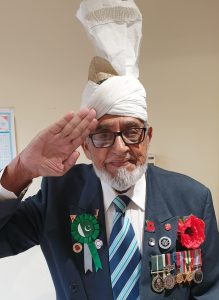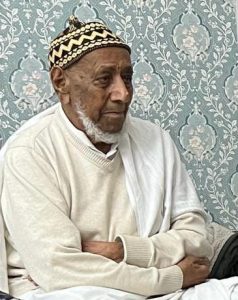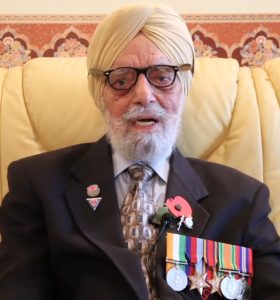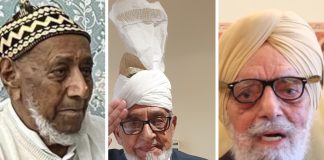As VE Day is marked across the UK, the incredible lives of three surviving South Asian veterans — Sergeant Mohammed Hussain, Subedar Mirza Khan and Sergeant Major Rajindar Singh Datt — remind us that Britain’s freedom was won by a global army.
“Please do not forget. Even after I’ve gone, remember the blood that was shed.”
On 8 May, Britain pauses to mark VE Day, Victory in Europe, the day Nazi Germany surrendered in 1945, bringing an end to the war in Europe. But while stories of British heroism are told in classrooms and memorials up and down the country, one group of soldiers remains largely missing from the narrative: the 2.5 million South Asian troops who served in the British Indian Army during the Second World War.
Among them are three extraordinary veterans still alive today — Sergeant Mohammed Hussain, Subedar Mirza Khan, and Sergeant Major Rajindar Singh Datt. Their courage, sacrifice and quiet dignity tell a story not only of war, but of resilience, injustice, and the long road to recognition.

A Teenager Against Fascism
Sergeant Mohammed Hussain was just 16 when he left his home in Mohra Bhuttia — now in Pakistan — and enlisted in the British Indian Army. His family were against it. His elder brother had already been captured and tortured by the Japanese in Burma.
So, he ran away.
“Because of what had happened to his brother, his parents refused to let him enlist. So, he ran away. He lied about his age,” says his grandson, Ejaz Hussain.
Mohammed trained as a gunner and wireless operator. He would go on to fight under Field Marshal Montgomery in the North African and Italian campaigns — including the brutal Battle of Monte Cassino.
A Hero’s Bravery, A Stolen Honour
In the final days of the war, on 26 April 1945, Hussain’s regiment came across a wooden bridge in Italy set ablaze by retreating German forces.
Rather than wait for orders, Hussain acted.
“He loaded explosive shells into the river under the bridge. The blast created a huge wave that extinguished the flames. It allowed the unit to cross and continue,” recalls Ejaz.
“But the act of heroism was never credited to him. A British officer took the credit and was awarded the Military Cross.
“My grandfather’s name was omitted from the dispatches. The officer’s relative was the only witness. It was an injustice that stayed with him his whole life,” says Ejaz.
A Life Rebuilt in London
After the war and later surviving a serious military accident in Pakistan in 1958, Mohammed Hussain eventually migrated to the UK and settled in London.
He brought his family over and helped build a life from scratch. Today, at 99, he continues to speak about peace, unity, and shared remembrance.
“Whether it’s Eid, Diwali or Christmas, we should open our doors to one another,” he says.
“The things that unite us are greater than the things that divide us.”
From Jhelum to Italy: Subedar Mirza Khan’s Journey
In Bradford, West Yorkshire, 101-year-old Subedar Mirza Khan is one of the last surviving

members of the Royal Indian Army Service Corps. Born in 1924 in Jhelum, his army journey began in 1941 when he signed up aged 17.
Khan served across Africa and Europe, supporting Allied troops with critical fuel, food, and ammunition.
“He was part of the logistics chain that kept the troops moving — always in danger, often under fire,” explains his son, Amjad Pervez.
The Silent Contributor
Mirza Khan, like many South Asian veterans, never boasted about his service. When he migrated to the UK, he became part of a generation who were vital to post-war rebuilding — but whose wartime contributions were rarely recognised.
“My father never spoke about his service much. But as a family, we’re incredibly proud,” says Amjad.
Fighting on Two Fronts: Sergeant Major Rajindar Singh Datt
Born in pre-partition India in 1921, Rajindar Singh Datt joined the Indian Army in 1941 as a young man determined to serve. By 1943, he had risen to the rank of Havildar Major — equivalent to Sergeant Major — and was sent to the frontlines in northeast India to take part in the pivotal Battle of Kohima.

From the brutal jungles of Kohima to the liberation of Burma, Rajindar was part of a mission that helped break through the Japanese defences and shift the tide of war in the Far East.
“We supplied rations and water, ammunition, everything to the front forces,” Rajindar recalled. “Sometimes they asked us, ‘Are you afraid?’ We told them we came voluntarily, and we came to fight. Bullets, machine guns — that was normal for us. The Sikh army was very strong.”
He was in Burma when Japan surrendered on 15 August 1945. “We were very happy when the Japanese surrendered. We said, ‘Thank God, we have won the war’.”
After the war, Rajindar returned to India before settling in Hounslow, West London, in 1963. He trained as a welder, raised his family, and continued to serve — this time as a proud advocate for remembrance and recognition.
He helped establish the Undivided Indian Ex-Servicemen’s Association and now works closely with organisations such as the Royal British Legion and Taxi Charity for Military Veterans.
Through teaching packs and online resources, Rajindar shares his story with future generations.
South Asia’s Overlooked Army
The British Indian Army was the largest volunteer force in history, with over 2.5 million men enlisted. More than 87,000 were killed, and tens of thousands more injured or missing.
Yet until recent years, their stories were absent from British memorials and school textbooks.
“These soldiers fought not just for the Empire, but for values we all share — dignity, justice, freedom,” says Amjad. “Their sacrifices deserve to be in our history books.”
Campaigns such as the Memorial Gates in London and calls to diversify the curriculum are slowly changing that, but recognition remains overdue.
Carrying the Legacy Forward
All three veterans — Hussain, Khan and Datt — continue to teach us through their actions and words. They are the last living voices of a generation that fought against tyranny but whose stories remain under-told.
Their families are determined to keep that legacy alive — not only in words but in how we teach history and honour all those who served.
“They didn’t ask for medals,” says Ejaz Hussain. “They asked to be remembered.”
A New Generation of Remembrance
As the UK grows ever more diverse, the importance of inclusive remembrance has never been greater. VE Day is a moment to reflect not only on what was won — but who helped win it.
“Remembrance is not complete unless it includes all of us,” says Amjad. “It’s time our history reflected the truth — that Britain’s freedom was defended by many nations, many colours, many faiths.”
This VE Day, as wreaths are laid and silence observed, let us remember the names of Sergeant Mohammed Hussain, Subedar Mirza Khan and Sergeant Major Rajindar Singh Datt — and the millions like them.
They were not just part of history.
They helped make it.




